Bloodshed and Power in Game of Thrones
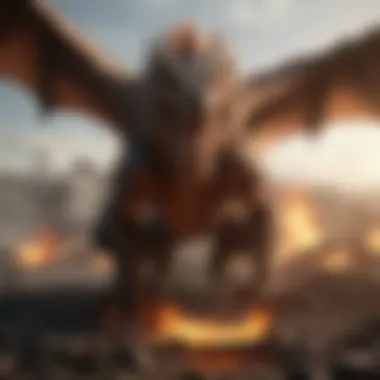

Intro
Through the vast expanse of the Seven Kingdoms, where dragons soar and steel clashes, Game of Thrones paints a canvas rich with conflict and ambition. Bloodshed is more than just a backdrop; it hovers like a dark cloud over every decision made by the characters. This exploration dives into the intricate web of fire and glory that defines battle and power in Westeros.
As we dissect the motivations that propel these characters—each with their own quest for dominance—we unveil a deeper narrative that goes beyond mere strategy. Themes of sacrifice, revenge, and the often-painful quest for justice manifest through bloodshed, offering a lens through which to analyze their choices and tragedies. Understanding these elements allows fans to grasp the profound implications of conflict in a world where allegiances shift like sand and survival often mandates moral compromise.
With this foundation laid, we now journey into the heart of Game of Thrones, beginning with character dissections that illuminate the driving forces behind the bloodletting and glory.
Character Dissections
In the realm of Game of Thrones, characters are not just participants in a story; they are reflections of the world’s complexities. Each character grapples with inner turmoil and external pressures, navigating a treacherous sociopolitical landscape. Let’s take a closer look at some pivotal figures.
Key Characters and Their Arcs
- Daenerys Targaryen: From a timid girl exiled in the shadows to a fierce leader commanding fire and dragons, Daenerys’s journey is emblematic of the quest for power. Her initial compassion slowly morphs into ruthlessness, culminating in the infamous destruction of Kings Landing. Her evolution underscores the dangerous allure of dominance and the cost of glory.
- Jon Snow: Born a bastard, Jon’s legitimacy is a recurring theme. His unwavering moral compass often puts him at odds with the brutal reality of politics in Westeros. Ultimately, his sense of honor leads to sacrifices that leave readers conflicted about the nature of true leadership.
- Cersei Lannister: Cersei’s character reveals the depth of human ambition and the lengths one will go for power. Her coldness and strategic mind lead to significant bloodshed, yet her vulnerability is also laid bare, showcasing the fine line between strength and desperation.
Character Development Throughout the Series
Character journeys in Game of Thrones are layered with complexities and the consequences of their actions. The show invites the audience to witness not only how characters change but why they are driven to such extremes:
- Transformation: Whether through betrayal or unexpected alliances, the series propels characters into situations where they must reevaluate their beliefs.
- Moral Ambiguity: Most characters exist in a gray area where good and evil often intertwine, making their choices all the more poignant.
Impact on the Overarching Storyline
The characters’ individual pursuits directly influence the trajectory of the series. Bloodshed is often the catalyst for pivotal moments:
- Major battles, like the Battle of the Bastards, are not just physical conflicts but also emotional climaxes in character arcs, drastically shaping relationships and alliances moving forward.
- Each character’s choice to engage in or step back from violence has rippling effects throughout Westeros, reinforcing the notion that every action reverberates through the fabric of the story.
Episode Breakdowns
For the astute fan, examining critical episodes reveals a tapestry woven with fire, glory, and the stark reality of mortal conflict. Each episode brims with moments that define the series and provoke thought:
Significant Events Recap
- Season 3, Episode 9: Known as the Red Wedding, this harrowing episode showcases the extent of betrayal and the brutal realities of power struggles. The sheer massacre symbolizes the unpredictable nature of alliances in Westeros.
- Season 6, Episode 10: The Winds of Winter brings political maneuvering to the forefront as Cersei seizes control through catastrophic means, illustrating the depth of her character’s evolution.
Exploration of Themes and Symbolism
Each moment carries weight, often laden with symbolic meaning:
- Fire: Representing destruction but also rebirth, fire frequently accompanies characters at their most transformative moments.
- Honor vs. Survival: The clash between idealism and pragmatism is a recurring conflict, often resulting in bloodshed, echoing the human condition.
Key Moments and Their Implications
The implications of these episodes extend far beyond their runtime, often reshaping character arcs and setting the stage for future conflicts. These moments of intense emotional and physical violence illustrate the thematic core of Game of Thrones—the quest for glory is often drenched in blood.
Lore Explorations
The intricate history and rich lore of Westeros form an essential backdrop to the series. Unearthing this lore supplies greater context for the conflicts that unfold.
Delving into Westeros’ Past
- The history of the Targaryens, their rise, and fall resonates with themes of vengeance, love, and betrayal.
- House Stark embodies honor and tradition, yet their downfall illustrates the tragic costs of unwavering principles in a merciless world.
Uncovering Hidden Details and Connections
Fans celebrate the links between historical events and character choices, often leading to fascinating theories regarding the future of Westeros.
Exploring Cultural and Mythical Aspects
The mythology embedded within Game of Thrones, such as the stories of the White Walkers or the prophecy of Azor Ahai, serves to enhance the sense of gravitas around bloodshed and glory. These mythic components illustrate how deeply rooted conflicts shape not just individuals but entire cultures.
Fan Theories
The realm of fan theories offers a fertile ground for speculation, giving viewers a chance to engage analytically with the material.
Popular and Intriguing Fan Theories
- R+L=J: This beloved theory, connecting Jon Snow’s true parentage to Rhaegar and Lyanna, feeds into the greater narrative of legacy and power.
- Bran as the Night King: This theory postulates Bran's transformation and its implications about time travel and destiny, raising questions about agency amidst bloodshed.
Evaluating Theories Based on Evidence
It’s essential to weigh these theories against evidence from the show:
- Thematic coherence often ties these theories into the greater narrative, illustrating how lore and character can be tightly interwoven to enhance the storytelling.
Speculation on Future Plot Developments
As discussions about the series persist, so too does speculation about potential paths forward, especially regarding unresolved narratives and character resolutions.
By weaving together character reflections, episode moments, historical elucidations, and fan-driven analyses, this comprehensive examination invites readers to ponder the nuanced landscape of Game of Thrones—a saga steeped in fire, glory, and the inevitable bloodshed that defines its essence.
The Significance of Fire in Game of Thrones
In the realm of Game of Thrones, fire emerges not merely as a tool for destruction but as a multifaceted symbol that propels the narrative forward. From the very first episode, flames flicker ominously, foretelling chaos, transformation, and stark reality that the characters must face. The representation of fire encapsulates the essence of power struggles, shifting allegiances, and the inevitable loss that often accompanies their pursuit.
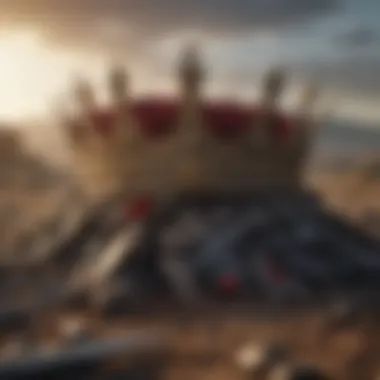
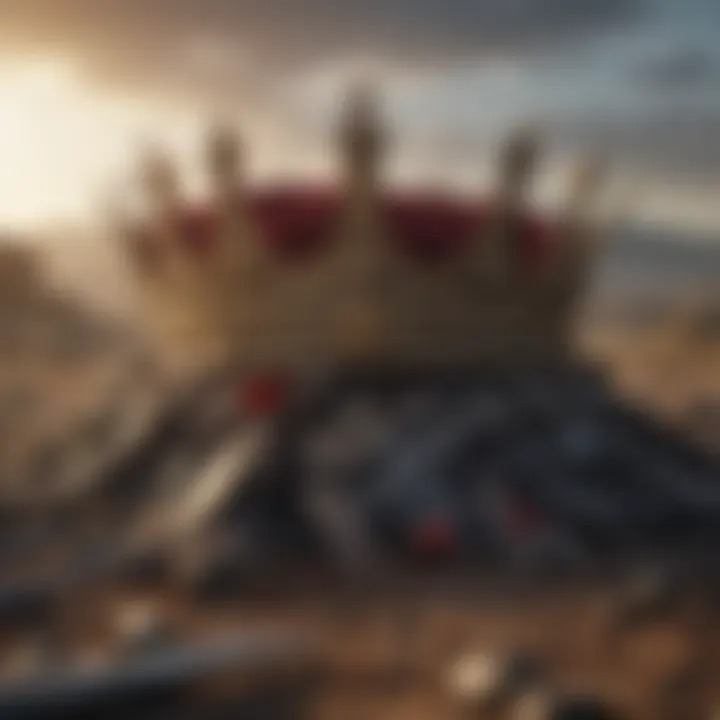
Fire in this saga often conveys a sense of inevitability, ushering in both downfall and renewal. It's emblematic not only of the fiery dragons' intense might but also of the inner turmoil faced by its characters. For instance, think about how Daenerys’s journey interlaces with fire—it symbolizes her identity, her claim to power, and the devastating consequences her choices bring.
To sum up, fire stands as a potent reminder of the dual-edged sword of power, representing both the destruction that leads to rebirth and the violent, unforgiving reality of war. There’s a fascinating complexity here, one that beckons the viewers to ponder over the delicate balance between creation and annihilation that fire brings forth in the tapestry of Westeros.
Fire as a Symbol of Destruction
Destruction reigns supreme in the world of Game of Thrones, evident through catastrophic events such as the razing of Harrenhal or the obliteration of King's Landing. Fire serves as the common thread binding these instances, symbolizing the dark undercurrents of ambition and revenge that afflict many characters. The episodes portray the gruesomeness of war—wings of dragons overhead set for a scorched earth. Here, the flame speaks a language of its own, one where entire bloodlines can be wiped off the map in a matter of moments.
Fire captures the reckless abandonment of ideals—where once noble houses crumble amidst the blazes of betrayal. It magnifies the themes of vengeance and pride, such as when Cersei Lannister unleashes wildfire to avenge perceived slights, ultimately sacrificing lives for her sense of honor. These elements underscore how fire epitomizes the destructive tendencies of humanity, inviting viewers to reflect on the broader implications of obsession, power, and authority.
The Role of Dragons in the Narrative
Within the narrative, dragons are not just mythical beings; they’re harbingers of fire. Their breath incinerates foes, yet their existence also transforms the political landscape of Westeros. Daenerys’s dragons serve as symbols of her lineage, and with them, she harnesses fire in both literal and metaphorical senses. Their ascent signals a shift from tactical warfare to a form of raw power that reshapes the game itself.
The dragons elevate Daenerys from a vulnerable exile to a formidable force. Each time they take flight, the air thickens with tension, as allegiances are tested, and kingdoms tremble in fear or hope. The dragons ignite the flames of ambition within characters, blurring the lines between fear and adoration. Observing the dragons’ impact prompts a deeper consideration of how power can corrupt and the cost associated with wielding such devastating force.
Cultural Significance of Fire in Westeros
Culturally, fire represents more than just destruction in Westeros; it’s also an elemental bond among the inhabitants. The connection between fire and culture reflects the dual roles it plays in traditions and rituals. For instance, the faith of R'hllor, the Lord of Light, embraces fire as a sacred element, drawing followers into an ideological conflict where belief and reality intertwine.
Moreover, fire is omnipresent in the way it shapes communities and their identities. The phrase “fire and blood” resonates powerfully, especially for the Targaryens, who see flames as an emblem of both their heritage and destiny. The populace's fear of dragons partly stems from the chaotic unpredictability that accompanies their legacy. Yet, it also ignites a kind of reverence—not just for the destruction they can cause but for the power they symbolize.
In essence, fire serves as a cultural touchstone for the people of Westeros, representing survival, deity, legacy, and the constant cycle of destruction and renewal that defines their existence. Viewers cannot ignore the deep-rooted implications fire has on their understanding of power, identity, and the ever-contentious nature of loyalty.
"Fire gives strength, but it also takes it away. What rises with flames may burn away those unprepared for its embrace."
This intermingling of existence and the consequences draws the viewer inevitably into the heart of the narrative, where each flame carries weighty significance.
Glory: The Duality of Heroism and Folly
The quest for glory is woven into the very fabric of human experience. In Game of Thrones, this pursuit is not merely a journey toward fame or honor; it embodies the tension between heroism and folly. Characters driven by the need for recognition often find themselves caught in a web of ambition, where each act of bravery can lead to tragic consequences. This duality of glory prompts viewers to question what it truly means to be a hero. Is a hero defined by their noble deeds, or do they become entangled in their own aspirations, leading to disaster for themselves and others?
By examining the motivations behind characters' ambitions and the ramifications of their quests for glory, we reveal the intricate layers of their personalities. Game of Thrones showcases that the relentless pursuit of glory often arises from a deep-seated desire for validation or redemption. However, the paths they forge can lead to ruin, not only for them but for entire kingdoms.
The Pursuit of Glory: Motivations and Consequences
In Game of Thrones, the motivations behind the characters’ pursuit of glory vary widely. For some, it springs from a desire to protect their loved ones or reclaim family honor. Take Eddard Stark, whose steadfast commitment to his beliefs ultimately leads him to make fatal choices. He pursues glory through principles, but this virtuous path contrasts sharply with the ruthless world he inhabits.
Others seek glory as a means to an end, like Cersei Lannister, whose ambition is defined not just by personal glory but also by consolidating power through manipulation and sheer cunning. Her relentless pursuit often blinds her to the consequences, affecting her family and the realm.
Key motivations include:
- Redemption: Characters like Jaime Lannister seek to reshape their legacies after making catastrophic decisions.
- Legacy: Many characters, particularly those with noble blood, are consumed by the need to unite their houses under a banner of prestige.
- Fear of Obscurity: Others, like Petyr Baelish, are driven by a fundamental fear of being forgotten, propelling them to commit unspeakable acts.
Ultimately, the consequences of their pursuits can be severe, leading to loss, betrayal, and a deeply ingrained sense of isolation. Even characters who initially appear noble are not immune to the pitfalls of their ambitions, casting doubt upon the very essence of their quest for glory.
Heroes and Anti-Heroes in the Quest for Glory
The landscape of Game of Thrones blurs the lines between heroes and anti-heroes, contextualizing the complexities of glory in the realm of ethical ambiguity. The series presents rich characters who embody this duality, prompting viewers to grapple with their definitions of heroism.
Jon Snow stands as a quintessential hero, driven by a sincere desire to protect the realm and unite disparate factions. His commitment comes at a high personal cost, showcasing that true heroism may lie not in glory for its own sake but in the sacrifices made for the greater good. His eventual battle against overwhelming odds elevates him to a revered status; however, his journey is steeped in personal sacrifice and loneliness.
Conversely, figures like Daenerys Targaryen exemplify the anti-hero archetype in her transformation from a charismatic leader to a tyrant consumed by the need to fulfill her destiny. Her story reflects how the pursuit of glory can morph from noble intentions to catastrophic results.
A closer look reveals that:
- Ambition can blind even the best of intentions.
- Moral compromises often accompany the quest for recognition.
- Consequences of these actions ripple throughout the realm, affecting countless lives.
"Ambition is the first step to success. The second step is action." — unknown
This characterization highlights the tragic irony present in Game of Thrones; glory becomes entangled in personal death and devastation. The showforces the audience to reflect on their own perceptions of heroism and the costs associated with pursuing one's aspirations.
Through glory’s portrayal, Game of Thrones remains a powerful reflection of the complexities of ambition, ultimately leading to a rich dialogue about the nature of heroism, the folly in blind ambition, and the often murky waters in which these themes coexist.
Blood: The Draining Cost of War
In the landscape of Game of Thrones, blood is not just a substance; it symbolizes the heavy toll of conflict. This theme resonates deeply throughout the narrative, illustrating how war affects lives, relationships, and entire societies. The portrayal of bloodshed in the series is woven intricately into character arcs and plot developments, highlighting how ambitions can lead to devastating consequences. Understanding the cost associated with blood—in terms of both human life and legacy—offers insights into the fabric of Westeros, where survival often comes at an unbearable price.
The Human Cost of Conflict
Conflict in Game of Thrones is rarely portrayed in a glamorous light. It strips away illusions of honor and valor, laying bare the profound human costs that come with war. Take, for instance, the Battle of the Bastards, a crucial turning point in Jon Snow's journey. The battle itself is a heartbreaking spectacle, where the hopes of many hinge on the outcome, but it’s the aftermath that lingers. Lives lost are not mere numbers; they represent families shattered and dreams extinguished.
Each death reverberates through the lives of the survivors. Sansa Stark's realization of the dangers of war becomes painfully clear as she grapples with the role she played in supporting Jon's decisions, knowing that it costs people they both cared for dearly.
"When the snows fall and the white winds blow, the lone wolf dies, but the pack survives."
This quote from Ned Stark encapsulates the essence of familial bonds and the fragility of life in a world dominated by bloodshed. Among each family’s losses, the Stewards of House Stark, the loyal men in arms, suffer tremendously. Their blood stains the fields, a striking reminder that victory often bleeds into tragedy.
Bloodlines: Legacy and Inheritance
The notion of blood extends to the concept of legacy and inheritance, a dominant theme that runs throughout Game of Thrones. Bloodlines carry the weight of expectation and honor, influencing characters’ motivations and actions. For instance, Daenerys Targaryen, often referred to as the 'Mother of Dragons', feels the burden of her family's legacy. She recognizes that her decisions are heavily influenced by the history of her bloodline, which dictates her path for reclaiming the Iron Throne.
However, the stark reality is that inherited bloodlines do not guarantee prosperity or power; they often lead to enmity and conflict. Characters like Cersei Lannister and Stannis Baratheon face their own demons regarding what their bloodlines demand. Their actions, often catastrophic, symbolize how their desire to uphold family honor in the face of external threats comes at immense costs, further exemplifying the draining effects of conflict.
In the twisted world of Westeros, a noble title means little if one’s blood calls for sacrifices that disrupt moral boundaries. The series powerfully demonstrates how lineage can become both a blessing and a curse, forcing characters down paths riddled with bloodshed and strife, and ultimately shaping the fate of the realm itself.
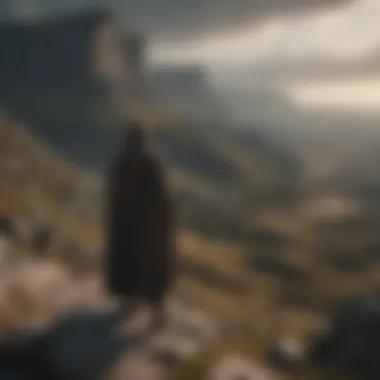
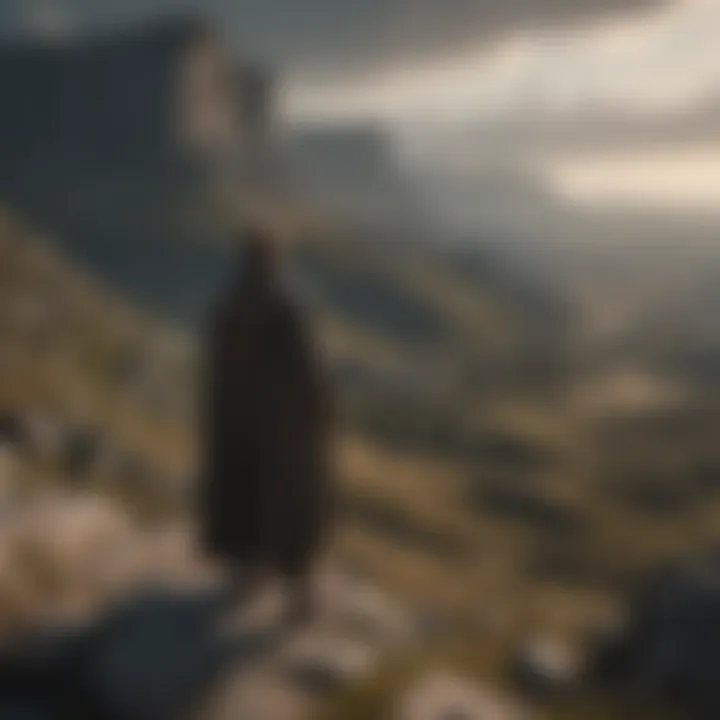
As we journey through the dark and tangled narratives in Game of Thrones, the element of blood emerges not just as a physical remnant of violence but as a haunting reminder of the sacrifices made in the name of power, family, and survival. Each drop spilled carries the weight of history, compelling viewers to ponder the larger implications of war and the irrefutable costs that accompany it.
Key Battles and Their Implications
In any narrative exploring conflict, the battles that shape the storyline are pivotal. In Game of Thrones, these key confrontations are not just about bloodshed; they encapsulate deeper themes of ambition, betrayal, and the human condition under duress. Each skirmish serves as a reflection of individual character arcs and broader societal changes, making them essential to understanding the epic saga.
A closer look at moments of conflict reveals a rich tapestry of motivations and repercussions. The battles are not merely plot devices but are crucial in illustrating the volatile nature of power and the often tragic consequences of the quest for glory. Alongside showcasing character transformation, these violent encounters drive themes of loyalty, honor, and survival.
The Battle of the Bastards: A Case Study
The Battle of the Bastards stands out as a remarkable representation of personal and political struggle. This confrontation between Jon Snow and Ramsay Bolton is set against the backdrop of Winterfell, a fortress laden with history and tragedy. What makes this battle noteworthy is its staging: the contrast of light and dark, justice versus tyranny.
Jon, representing the cause of the North, faces Ramsay's calculated cruelty. The stakes go beyond winning a physical confrontation; it embodies Jon's quest for identity—an illegitimate son reclaiming his rightful place.
Key elements of this battle include:
- Cinematic Excellence: The choreography of fight scenes combined with the broader themes of honor sets this battle apart. The way the tension builds, with both sides poised to clash, underscores the stakes involved.
- The Role of Alliances: Jon's struggles highlight the importance of alliances—the Knights of the Vale's late intervention tipped the scales decisively.
- Emotional Weight: The confrontation pits not just armies but ideals against each other, reminding viewers that personal sacrifices often accompany such conflicts.
"No one is perfect. But somehow, you’ve made it easier to be brave." - Jon Snow
The Siege of King’s Landing: Strategies and Outcomes
The Siege of King’s Landing represents the climax of various storylines converging into a massively significant confrontation. This battle highlights the tactical acumen required in warfare, showcased through the contrasting strategies of Daenerys and Cersei Lannister. Cersei's fortified city stands as a symbol of resilience, while Daenerys's dragons embody raw destruction.
The siege coalesces themes of desperation, loyalty, and the pursuit for power, as both sides use every trick in the book. Manipulation of resources, influence over the populace, and psychological warfare play crucial roles.
Important aspects include:
- Urban Warfare: Unlike the open battles seen before, King’s Landing is a labyrinth of narrow streets and dense population, complicating tactics for any siege.
- Impact of Civilian Casualties: The aftermath of this siege brings a heavy moral burden, showing how the cost of war reaches beyond the battlefield.
- The Aftermath: This siege alters the balance of power dramatically, setting the landscape of Westeros for what is to come. The brutality displayed serves as a cautionary tale about the price of ambition.
The Long Night: Nature of a Different Type of War
The Long Night shifts gears dramatically from the previous human conflicts. This is a war against an existential threat rather than political rivals, introducing themes of unity and the fight for survival. The battle against the Night King serves as a poignant reminder of humanity's fragility in the face of absolute evil.
The nature of this war is unique, encompassing various factions coming together against a common foe. Old rivalries take a backseat as characters from divergent backgrounds unite, reflecting on the complexities of human relationships under duress.
Critical considerations include:
- Alliances Formed Out of Necessity: Unlike previous battles, this war leads characters to reevaluate their motives, forming bonds that were previously strained or non-existent.
- Psychological Warfare: The Night King's invasion utilizes fear as a weapon, causing deep-seated fears in the characters and leading them to make unexpected choices.
- Philosophical Undertones: The Long Night forces characters to confront their beliefs about life, death, and what it means to be human. The battle is as much about survival as it is about moral choices made in dire circumstances.
Philosophical Underpinnings of Violence
In the realm of Westeros, where betrayals loom large and valor is often forfeited on the altar of ambition, the philosophical underpinnings of violence take a center stage. Understanding the ethics of war and the dynamics of power dynamics are essential not just to comprehend the narratives that unfold but also to grasp the underlying ideologies that motivate individuals and factions throughout the Game of Thrones saga. It's a world that begs us to reflect: is violence an inevitable tool of the powerful, or does it spring from deeper moral quandaries?
The Ethics of War in Westeros
War, as depicted in Game of Thrones, isn’t simply a backdrop; it's a catalyst that propels character development and plot progression. The ethical implications are tremendous. On the battlefield, characters are often faced with stark choices that spotlight their moral fiber. From Robb Stark's doomed quest for honor to Cersei Lannister’s ruthless machinations, the ethical dilemmas they confront shed light on their symbolic representations of humanity's darker instincts.
For instance, consider the contrasting philosophies that govern the Starks and the Lannisters. Robb Stark embodies the belief in honor and loyalty, yet these ethical principles ultimately lead to his downfall. In stark contrast, Cersei’s often viewed as a Machiavellian figure, wielding power without the entanglements of morality. Her approach reflects a relentless pursuit of self-preservation and dominion, revealing how ethics can be subjective—donning different faces to different people.
Moreover, countless battles bring to life the consequentialist perspective on ethics. The Siege of King's Landing, for instance, serves as a narrative fulcrum that questions the morality behind 'the greater good.' Is the bloodshed justified if it leads to a restored order? This leads us down a rabbit hole of moral philosophy that challenges our understanding of justice, retribution, and the cyclical nature of violence within society.
Power Dynamics: Who Holds the Flame?
Why do some characters wield the flames of power with grace, while others falter under their weight? Power dynamics in Game of Thrones are nothing short of a volatile equation, influenced by alliances, betrayal, and the sheer unpredictability of human emotion. The phrase "Who holds the flame?" isn't merely rhetorical; it underscores the precarious nature of leadership within a world marred by bloodshed.
- The Iron Throne is emblematic of this struggle. Numerous characters vie for control, yet few grasp the true essence of power. Daenerys Targaryen, with her affinity for dragons and fire, represents a distinct embodiment of power that melds destruction with the promise of rebirth. However, as her journey progresses, the destructive power that she wields leads to catastrophic outcomes.
- Conversely, figures like Tyrion Lannister, often seen as the underdog, navigate the treacherous waters of political machinations with sharp intellect rather than brute strength. His perspective illustrates that it’s not always the loudest roars that command respect, but wisdom cloaked in humility.
The struggles between various factions represent a broader commentary on how power operates within society. Each character engages in a precarious dance, reminiscent of a classic chess game, where every move can spell doom or destiny. The question remains: are they masters of their fate, or mere pawns in a larger game orchestrated by fate and prophecy? Ultimately, examining these power plays invites readers to ponder the complexities surrounding authority, ambition, and the turbulent cost of violence.
"In the games of thrones, only the dead have seen the end of war." – Plato (At least, one could argue so within Westeros!)
This exploration of philosophical underpinnings reveals the intricate layers of thought embedded in the narrative of Game of Thrones. By reflecting on these elements, we grasp a deeper understanding of violence not just as a narrative device, but as a fundamental aspect of the human condition.
Character Arcs Shaped by Fire, Glory, and Blood
Character arcs in Game of Thrones function as the lifeblood of the narrative, weaving together the intricate themes of fire, glory, and blood. These arcs are not merely the personal growth or decline of individuals; they embody the collision of ambition with moral compromise, showcasing how various motivations drive characters to triumphs or tragedies. Examining these arcs adds depth to understanding Game of Thrones' portrayal of human nature, where fear, desire, and power struggle against the backdrop of mythical creatures and brutal conflicts.
Each main character's evolution reveals a facet of the story that echoes the larger struggles of Westeros, illuminating the implications of choices made in pursuit of power or redemption. Below, we delve into three crucial characters whose lives are shaped profoundly by fire, glory, and blood—Daenerys Targaryen, Jon Snow, and Cersei Lannister.
Daenerys Targaryen: Fire's Embrace and its Fallout
Daenerys, often referred to as the Mother of Dragons, illustrates the volatile interplay of fire and the quest for rulership. Originally a timid girl, she metamorphoses into a figure of power, fueled by the flames of her dragons and the ambition instilled in her by her lineage. Her quest for the Iron Throne, driven by a complex mixture of vengeance and justice, encapsulates the age-old struggle of fire as a symbol of both creation and destruction.
Over the seasons, Daenerys's relationship with fire reflects her inner turmoil. The fiery destruction she unleashes upon her enemies eventually leads to catastrophic losses, pushing her further into moral ambiguity. The flames might rise to her command, but after the destruction of King's Landing, it becomes clear that fire can consume as easily as it can empower. Her journey encapsulates the notion that glory gained through bloodshed can lead to unforeseen consequences.
Jon Snow: The Weight of Duty and Sacrifice
Jon Snow’s character arc represents the cornerstone of honorable sacrifice in a world rife with treachery. He embodies the tension between destiny and choice, grappling with his identity as both a Stark and a Targaryen. His commitment to duty and loyalty, especially as the leader of the Night’s Watch, places him in moral quandaries that often test his very principles.
The bloodshed Jon witnesses shapes him into a reluctant warrior. Each decision, be it his involvement in the battle against the White Walkers or his heartbreaking choice to kill Daenerys, exemplifies the burden of being a leader in tumultuous times. Ultimately, Jon's heavy heart echoes the idea that the glory of leadership comes with its share of blood—both his and those he loves.
"The things I do for love the weight of it crushes my heart, yet it weighs heavier still on the shoulders of my people."
Cersei Lannister: The Dark Side of Ambition


Cersei Lannister embodies the electrifying yet perilous pursuit of glory through ruthless ambition. Her rise to power highlights the darker elements of human nature as she navigates through a world of manipulation, betrayal, and strategic violence. Cersei’s tenacity in securing her family’s legacy exemplifies how blood—both familial and adversarial—fuels her ambitions.
Her arc reveals the lengths she is willing to go to protect her crown, often at the expense of morality. The destruction of the Great Sept of Baelor is a prime example of her willingness to embrace the inferno of chaos for power. In this ruthless landscape, glory becomes entwined with the blood of innocents, showcasing the high cost of ambition in a world where the game of thrones is played with deadly stakes.
In wrapping up these character arcs, it is crucial to note that the interplay of fire, glory, and blood creates a rich tapestry that reflects the moral complexities intrinsic to Game of Thrones. Their journeys challenge viewers to ponder the implications of loyalty, desire for power, and the heavy burden of legacy, making their fates resonate long after the final credits roll.
The after-effects of War on Society
When we look at the world of Game of Thrones, it’s easy to get lost in grand battles and colorful characters. However, the true weight of war often hides behind the thunder of swords clashing and dragon fire. The after-effects of war on society extend far beyond the battlefield, sending ripples that can be felt in generations to come.
Now, just imagine the layers of chaos thickening over each house in Westeros. Each significant conflict, be it the War of the Five Kings or the Siege of King's Landing, leaves a scar not only on individuals but also much deeper within the societal fabric. The ramifications are multi-faceted—economic, psychological, and moral. It's essential to recognize these effects as we embark on understanding how the people of Westeros grapple with the aftermath of bloodshed.
"In war, there are no unwounded soldiers, whether they bear scars on the outside or wounds beneath the surface."
Rebuilding in the Ashes: The Long-Term Effects
After the dust has settled, rebuilding becomes the canvas upon which societies brush their next chapter. The destruction in places like King's Landing was profound. Buildings lay in ruins, but more crucially, communities were left fractured and divided. The destruction of family units, loss of friends, and changed social hierarchies create a cloud that hangs over the survivors.
Communities are often left with just remnants of what they once were. Trust is shattered, and grief lingers in the air. Some, like the survivors of the Red Wedding, are forever marked by that single event. They might push through, but they also carry the pain.
Important components of rebuilding include:
- Economic Revitalization: Cities must find ways to recover economically. Businesses that once thrived now have to start from scratch, which can take years, if not decades.
- Social Justice: Survivors seek some form of justice—be it retribution against those responsible for the misery or reparations from the crown. This often fuels further resentment.
- Cultural Revival: Art and traditions may also suffer. Rebuilding efforts must also focus on cultural representation, a crucial element for identity.
The long-term effects are not solely about the physical. They’re deeply entrenched in the psyche of the population. Fear can dominate decision-making, making people suspicious of change or foreign influences.
The Evolution of Power Structures Post-War
The chaos ignited by war tends to alter the balance of power significantly. Authority figures can collapse overnight, while others might rise from the ashes of uncertainty. This constant dance of power dynamics is evident through various characters and factions in the series.
In the wake of war, the vacuum that is created often leads to the emergence of new leaders. For instance, after Robert Baratheon's death, different houses attempt to stake their claim to the throne. Each faction believes they're the rightful rulers, but who really holds the power when the dust settles? It's like a game of chess where every piece is fighting for its identity while the board itself is still being scrambled around.
Key points regarding evolution of power post-conflict include:
- Shifts in Loyalty: People might switch allegiances based on survival or personal gain, which can lead to unexpected alliances.
- Discontent Among the Nobility: Noble houses take it on the chin, nurturing resentment if they feel unacknowledged or overlooked in the new order.
- Emergence of New Orders: Those left standing in the aftermath often rewrite the rules, claiming authority based on experience gleaned from surviving the strife.
In summary, while the barren landscapes of conflict are evident, what remains hidden is the ongoing struggle for societal renewal and power restructuring. The after-effects of war etch themselves deep into the memory and culture of Westeros, affecting not just the present but shaping the future in profound ways.
The Role of Prophecy and Fate
Prophecy and fate weave a complex tapestry in the narrative of Game of Thrones, shaping destinies and driving the motivations of various characters throughout the series. Within Westeros, prophecies often serve as both a guiding light and a shadowy cloud, tempting individuals with foretold glory while simultaneously trapping them in a cycle of fate they cannot fully comprehend. The alluring promises of power and success at first glance appeaars to invigorate characters, but the reality of navigating fate proves to be much more arduous.
The constant tension between prophecy and personal agency fundamentally influences character development and the overarching plot. When destinies appear set in stone, characters must grapple with the tension of whether to embrace or resist these predictions. This struggle backdrop reveals the innate human desire to control one's own fate, pushing the narrative into deeper philosophical waters.
In this exploration of prophecy and fate in Game of Thrones, we will examine how prophetic visions influence key decisions, how they drive characters to conflicting choices, and what it ultimately means for understanding moral complexities within the narrative.
Prophetic Visions: The Influence of Destiny
Prophetic visions are like ghostly whispers in the dark, often vague and open to interpretation. They exert a strong influence on the actions of characters, subtly steering them toward their supposed destinies. For instance, the infamous prophecy of the "Prince That Was Promised" swirls around characters like Daenerys Targaryen and Jon Snow, igniting their ambitions and instigating pivotal decisions.
"The long night is coming, and the dead come with it. The prince that was promised shall bring the dawn."
This prophecy not only shapes their paths but also captures the imagination of entire factions within Westeros. As characters come to grips with their role in the grand design, they may either align themselves with their predicted fate or fiercely resist it, creating a ripple effect that alters the balance of power.
The murkiness surrounding prophetic visions leads to conflicts among characters who interpret the same prophecies differently. Melisandre, for example, places immense faith in her visions, which leads her to manipulate the fate of others like Stannis Baratheon. This instance shows how an individual’s understanding of prophecy can redirect the course of history in unexpected ways.
Fate Versus Free Will: Characters’ Choices
As much as prophecy appears to dictate destinies, characters in Game of Thrones frequently demonstrate the power of free will in the face of seemingly unavoidable outcomes. The question arises: when a character is faced with a prophecy, how much control do they truly have over their fate?
This quandary is particularly pronounced in the arcs of characters like Bran Stark, whose journey intertwines with visions of the past and future. While he has glimpses of what lies ahead, his choices still bear weight on the world around him. His story reflects the interplay of fate and decision-making: while some events seem preordained, the nuances of choice can create diverging paths. Similarly, characters like Cersei Lannister and Tyrion Lannister evoke discussions about accountability and consequence, hinting that even in a world riddled with prophecy, personal choices carry gravitas.
Ultimately, the exploration of fate versus free will within Game of Thrones opens a Pandora's box of philosophical reflections. It poses questions about responsibility, consequence, and the human condition, echoing real-world dilemmas that persist long after the final episode aired.
In this light, both prophecy and individual choices enrich the narrative, weaving together the stories of fire, glory, and the bloodshed that shapes the stark realm of Westeros.
Fan Theories and Interpretations
The landscape of Game of Thrones is not just defined by its twists and turns on screen; it is also shaped by the vibrant discussions and theories put forth by its dedicated fanbase. The significance of fan theories within this article lies in their ability to engage viewers beyond mere consumption of content. They delve into the uncharted waters of speculation, opening doors to new interpretations and offering a fresh lens through which to examine character motivations and plot developments. Each theory represents a unique perspective, contributing to a collective narrative that reflects both the depth of the series and the creativity of its audience.
Exploring Speculation: What Lies Ahead?
The realm of speculation is a vivid playground for fans. Theories about what might happen next are rampant, particularly given the series' complex arcs and unresolved threads. For instance, how will the remaining Stark children navigate the shifting power dynamics of Westeros? Will Daenerys Targaryen truly rise from the ashes, or have her past decisions sealed her fate? The scope of possibilities is virtually limitless, and quite fascinating.
Fans often turn to symbolic connections and character arcs to support their theories. For example, the significance of direwolves, dragons, or even specific locations often transcends their function within the narrative and serves as a focal point for deeper meanings. While some theories appear highly imaginative, they often create discussions that reveal underlying themes such as loyalty, sacrifice, and the quest for identity, illuminating the intricate tapestry of the story.
Key speculative threads worth exploring include:
- The Resurrection of Characters: From Jon Snow's dramatic return to potential reappearances of other key figures, death in Game of Thrones is rarely final. What does this mean for the character dynamics in the future?
- The Fate of the Iron Throne: With so many vying for power, what might the destiny of this coveted seat reveal about the ultimate message of the series?
- Character Alignments: Analyzing shifting allegiances offers a treasure trove of speculation and discussion, especially with characters known for their duplicitous nature.
The Nature of Glory: Varied Perspectives
Glory, an ever-elusive concept in Game of Thrones, is interpreted differently through various lenses. For some, it symbolizes the pinnacle of achievement, often pursued with fervor, while for others, it might represent a hollow ambition leading only to despair.
Consider how glory intertwines with the fates of pivotal characters - Daenerys Targaryen's blazing ambition contrasts starkly with Bran Stark's reluctant rise to power. Each viewpoint adds to the richness of discussions, prompting fans to dissect personal motivations and moral choices.
Some discussions around glory often revolve around:
- Ambition Versus Integrity: How do characters reconcile their desires for glory with their moral compass?
- Consequences of Pursuing Glory: The impact of characters' quests for glory not just on themselves but on the larger world of Westeros.
"Ambition, like fire, consumes everything in its path, but it may also ignite flames of greatness."
The varying perspectives on glory not only make for stimulating discussions but also impact how fans engage with the story's outcomes. The rich interpretations ensure that discussions about Game of Thrones are ongoing, thriving well beyond the show's conclusion.



